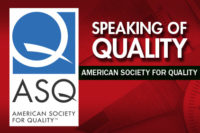“In the future, quality will be a measure to understand which product is more comfortable to human, society, and earth. Quality of human life will be focused on.”
- Hitoshi Kamikubo, Associate Director, Union of Japanese Scientists and Engineers (JUSE), from Emergence—2011 Future of Quality Study
Emergence—2011 Future of Quality Study, a report ASQ published in November 2011 (the sixth such study ASQ has conducted since 1996), revealed several statements about the quality professional. Two years later, these statements remain important.
The study’s “Implications” section was culled from the 200-plus study panelists’ statements and distilled to form categories. Here are a few that shed light on the profession as it moves forward in the 21st century.
Quality professionals will need to be willing to significantly change the way in which they think of their jobs and themselves.
Standalone quality departments could very well be things of the past. As quality infiltrates organizations, it would only logically follow that standalone departments would no longer be needed.
The dwindling department does not spell doom for the quality professional. On the contrary, this is good news. There will be more opportunities for the quality professional in management. The progression could look something like this:
Line/middle managers move into roles of responsibility that include monitoring quality practices/initiatives. Quality professionals move into higher levels of the organization with more decision power as oversight of quality learning and training.
To accomplish this, however, the quality professional will need to prepare for the scenario. Many of the experts mentioned that quality professionals must broaden their skill set—a skill set outside of the typical quality, statistical, and technical regime. Panelists noted that knowledge in the humanities (psychology and sociology), business management, and knowledge transfer, will be essential in the near future.
2011 Future of Quality Study, ASQ
Regardless of your field, sharpening your skills and broadening your expertise is always good for your professional development. In the quality profession, learning opportunities are plentiful. Courses, conferences and certifications are all available to help you elevate your career.
What the panelists are stating is that you must reach beyond the traditional quality study and begin taking business management, psychology, and knowledge transfer courses. While your statistical, auditing and technical skills helped you excel in the quality department, business and humanities knowledge will keep you relevant to your organization. This does not mean you need an MBA or Ph.D., but you will need to balance the stats with the soft skills. And if executives aren’t going to speak your language, speak theirs.
This is only part of the story. While it’s certain the quality profession will change in the future, the specifics of the changes will only be clear when the future becomes the now. To get a handle of what the “now” is like for the quality professional, we can visit the 27th annual Quality Progress Salary Survey. The 2013 version of the study has just been released and sheds light on what is occurring now and into the New Year.
Average full-time salary did increase to $88,458 in the United States, but that translates into a slight 1.58% increase since the 2011 study. The more enlightening figures reveal themselves further in the study. While quality professionals are the majority of respondents, hiring managers are also tapped to give an indication of what the job outlook is for the quality community.
Fifty-nine percent of respondents state they will be hiring in 2014. They were given the opportunity to list the most important attributes of a candidate. Experience, of course, ranked high. Interestingly, it was not quality profession that ranked highest but general work experience. HR officers also value industry experience as a separate attribute. Along with these skill sets, survey respondents want a hire to be a good team fit, display excellent communication skills, and demonstrate adaptability and problem-solving skills. Professional credentials such as certifications and degree credits are also a plus.
It comes down to this: Don’t shortchange your professional development. Make sure you have a set development plan and reach your goals. And remember, this doesn’t necessarily mean taking a Six Sigma or lean course. Your development might need to come from courses in interpersonal communication or project and team management.
Whatever your goals, there is a place for you in the quality profession. Continue to learn and find new ways to apply that knowledge. Emerge as a stronger professional.



